What is Low Maintenance Gardening?
 Sunday, February 5, 2017 at 4:30PM
Sunday, February 5, 2017 at 4:30PM Some people would say a low maintenance plant is one that will grow and prosper with no supervision or care. I would say that is probably a weed. All garden plants, like children, require proper nourishment and training. Otherwise they may grow into thugs or else become sickly or even perish.
So even a "low maintenance" plant requires some maintenance. Shrubs and trees, when planted in the right place, generally require less than perennials and annuals. Groundcovers, when planted where their spreading habits are welcome, are also low maintenance. (Groundcovers planted in a garden bed with flowers can become nightmares.) 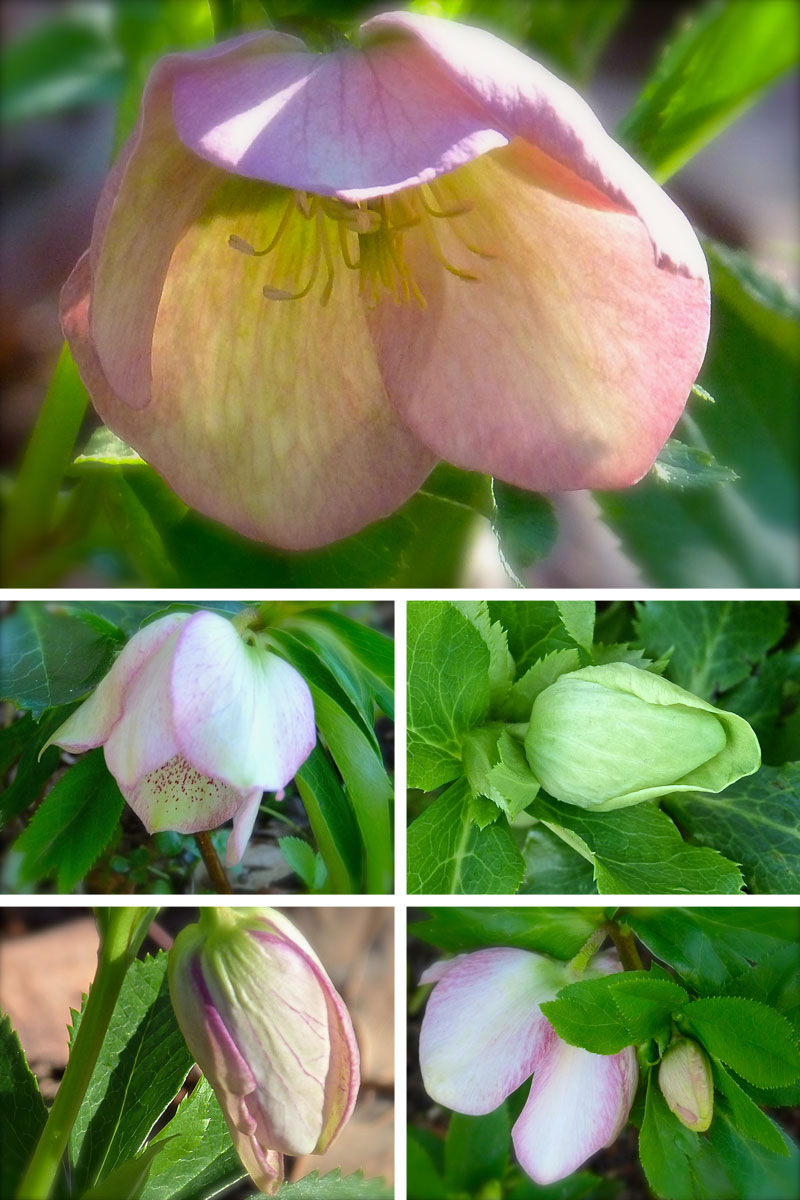 Hellebores are an early blooming evergreen ground cover whose blooms last for months. I cut back the foliage in late winter as new growth begins. I consider them low maintenance.
Hellebores are an early blooming evergreen ground cover whose blooms last for months. I cut back the foliage in late winter as new growth begins. I consider them low maintenance.
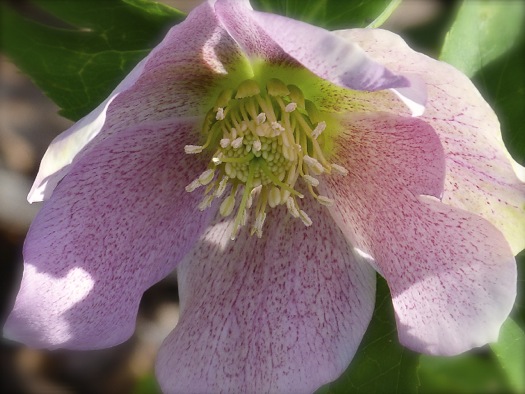
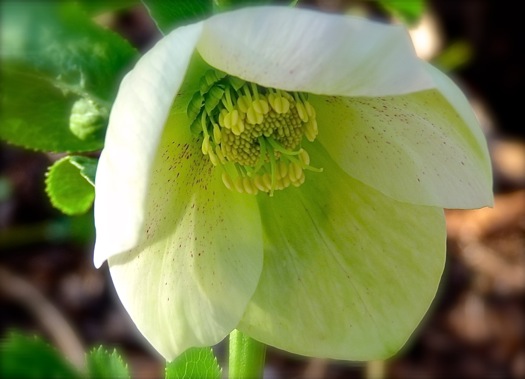
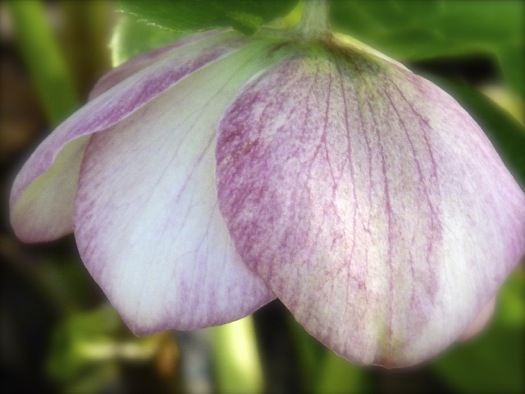 If a plant needs little other than pruning once a year or less and some fertilizer in the spring, I consider it a low-maintenance plant. An occasional spray with an organic horticultural oil to kill pests, as well as watering in times of drought, is something that just comes with the territory. Mulching around plants in spring to minimize weeds, to conserve soil moisture, and to promote soil fertility is also standard care for all plants.
If a plant needs little other than pruning once a year or less and some fertilizer in the spring, I consider it a low-maintenance plant. An occasional spray with an organic horticultural oil to kill pests, as well as watering in times of drought, is something that just comes with the territory. Mulching around plants in spring to minimize weeds, to conserve soil moisture, and to promote soil fertility is also standard care for all plants.
My low maintenance list includes shrubs such as camellias, chaenomeles, forsythia, spireas, fothergilla, viburnums, edgeworthia, azaleas, dystillium, and many more.  Camellia japonica blooms in my late winter garden.
Camellia japonica blooms in my late winter garden.
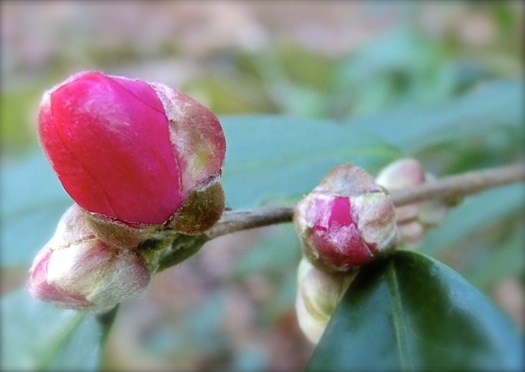 Camellia bud on an old, low maintenance camellia shrub, which delivers hundreds of blooms every year.
Camellia bud on an old, low maintenance camellia shrub, which delivers hundreds of blooms every year.
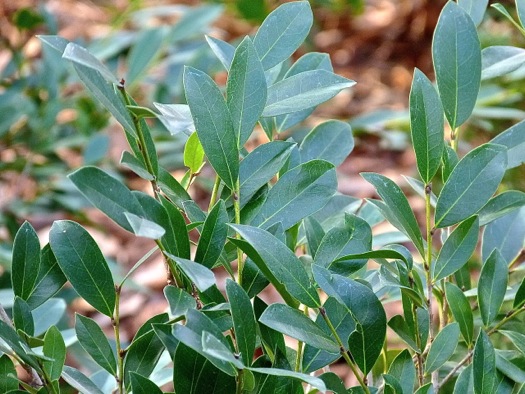 Dystillium is a low maintenance evergreen shrub in the woodland garden.
Dystillium is a low maintenance evergreen shrub in the woodland garden.
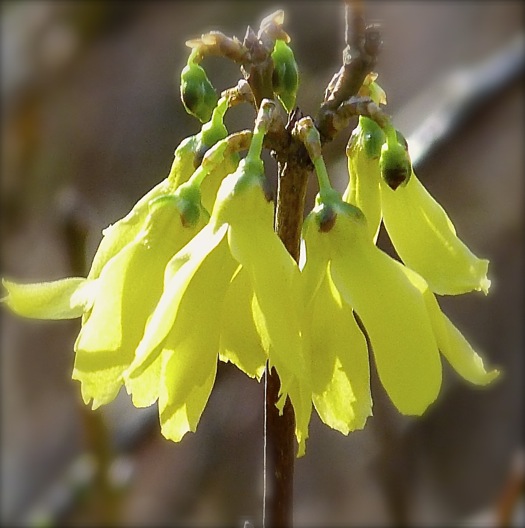 Forsythia is another low maintenance shrub with early blooms.My low maintenance list does not include roses. Even though most of my roses are easy-care varieties such as knock-out and drift roses, they do require some spraying to minimize disease and more pruning and fertilizing through the season. My yaupon hollies are extremely durable, and I have never fertilized them; I would almost call them low maintenance, except that they require pruning in late winter and late summer to maintain their size and shape.
Forsythia is another low maintenance shrub with early blooms.My low maintenance list does not include roses. Even though most of my roses are easy-care varieties such as knock-out and drift roses, they do require some spraying to minimize disease and more pruning and fertilizing through the season. My yaupon hollies are extremely durable, and I have never fertilized them; I would almost call them low maintenance, except that they require pruning in late winter and late summer to maintain their size and shape.
Annuals, perennials, and vegetables are not low maintenance. Most require regular fertilizing, dead-heading or pinching back, and spraying for disease and bugs. Did I mention weeding? Plants in pots require more watering. I have some of all of these, but only as accessories. Flowering shrubs and trees are the backbones of my huge garden; while many of my plants are low maintenance, I would not call my garden that, because of the size of it. You should plant a garden only as large as you have time and energy to maintain.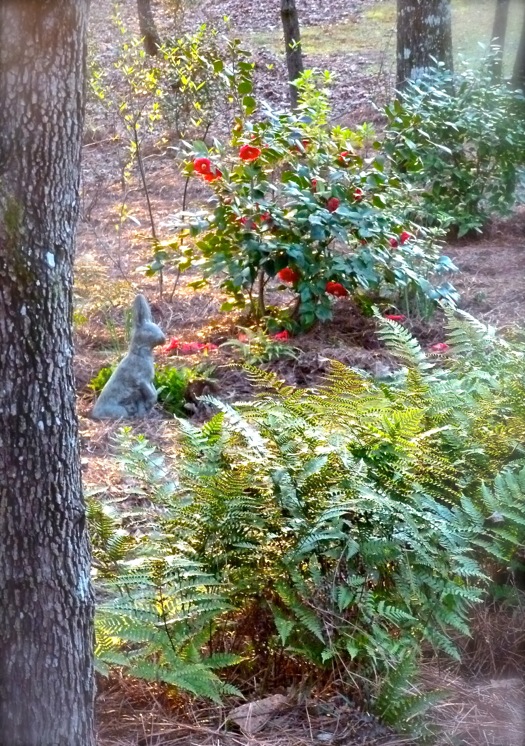 Autumn fern in the foreground and Camellia japonica 'Gunsmoke' in the background are low maintenance plants in the woodland garden.
Autumn fern in the foreground and Camellia japonica 'Gunsmoke' in the background are low maintenance plants in the woodland garden.
I love gardening. For me, garden maintenance is about maintaining my own well being. The lessons of birth and death and rebirth, and all the forces in-between, are revealed in a garden. The spiritual power at work in a garden can comfort a broken mind or refresh a tired body. I don't mind the maintenance.
Reader Comments (15)
Good points, and a perspective I hadn't considered in this type of detail before. It's interesting, because I consider many of my perennials more low-maintenance than most of my shrubs. The shrubs require pruning (and the rabbits eat them) and quite a few of the perennials require next to nothing from me (except maybe to remove non-native invasive plants near them). But it could have something to do with the climate and the soil. Of course, I can't grow Camellias like you can. :(
Maintenance activities make one part of the garden, which I also consider important to my psyche, so I don't mind these chores at all either. Of course, some chores give me a greater sense of purpose than others - digging up weeds is useful but cleaning up the mess left by raccoons is simply frustrating. Thanks for your suggestion on using pepper as a deterrent. It's something I haven't tried but will.
Low maintenance is so hard to quantify. Comfortably manageable sounds better,,,but even that depends on the abilities of the gardener :)
Very timely post, because I've been pondering this issue in my own garden.
I do agree with you that trees and shrubs - properly situated - seem to be more low maintenance than almost all annuals and perennials.
That said, I just purchased a battery-powered hedge trimmer and want to experiment with it as a means of cutting back perennials and ornamental grasses more quickly. If it works as intended, I do think it could help vault a number of plants into the "low maintenance" category.
That said, they'll still be more work than a juniper or a rose of Sharon or an osmanthus or a camellia that just grows year after year without needing anything from me except perhaps occasionally pruning a branch here or there (not even that if the shrub is in the right place).
I guess there are some exceptions to that rule too though. For instance, it's my understanding that certain shrubs or sub-shrubs (autumn sage and blue mist spiraea, for example) do best when given a hard trim each spring. Hopefully the battery-powered hedge trimmer will help with those as well, cutting them down to size without mangling them.
Love your post! garden maintenance depends on the person, for me, gardening is a hobby, while others see it as work. I am planting more carefree plants such as ferns and bromeliads, but yes, adjust the size of the garden to the available gardening time.
I think 'low maintenance' isn't a precise amount of time but is what time the gardener is prepared happily spend in the garden! For some that might be a couple of hours a day or a few hours a year!!
I would say the majority of my plants are low-mainenance, even many of the perennials, as I do pretty much nothing for them other than end of the season clean-up. My roses and vines always do take more care. I try to plant the right plant in the right spot so that it will take almost no care from me. It doesn't always happen, but that that's the goal! I love your hellebores! Sadly the deer have eaten mine to the ground this year.
I am concerned that some people believe that low maintenance equates to no maintenance. I agree with you about gardening being good for our well-being. I certainly find peace and the space to think while maintaining my own garden. I also think that I am much stronger and fitter than I would be if I didn't get outside and garden.
Hi, Deb, I think you are posting an interesting question here. My own garden, even though small, is definitively a high maintenance garden because of all the roses that I am growing. And I exactly liked it that way, since I love gardening and working in my garden is a joyful thing for me.
But lately I have reached the limit of time that I can comfortably dedicate to my garden, so I have to think about how to proceed. In my case, it means not planting any more roses, but replacing the ones that don't do that well with healthier more satisfying varieties and also planting other plants that besides needing minimal care look after themselves.
Warm regards,
Christina
A truly low maintenance plant might be plastic or, as you say, a weed. I would consider my roses to be low maintenance. I fertilize them and cut them back about once a year and that's about it. In general, shrubs are more low maintenance than perennials. A lot of annuals require frequent deadheading but I may still consider them low maintenance because I like deadheading.
Great discussion of what "low maintenance" means in gardening. For me, mulching in spring to reduce the need to weed in summer is part of a low-maintenance strategy. It's funny, but I don't think of dead-heading as part of garden maintenance -- probably because I do it as part of my stroll through the garden each morning, which I experience as a form of relaxation.
Camellias and ferns are low maintenance in my garden. Hellebores not so much. Your plants look very happy.
I love all your garden e-mails! The pictures you take are amazing! Thanks!
No annuals here.
The Californian poppies self-seed and I weed out the tired old ones.
Because I choose a lush shrubby garden, pruning, keeping the paths open is work, but enough for good exercise. Just 3 potted roses is also low maintenance, regular dead-heading rather than pruning as such.
I don't mind the maintenance either Deb as it is such a joy to work outside (although I confess to whining about it just a bit in summer!) I am so envious of your lovely hellebores! I have one which seems to have done quite well and has a few flowers but not the gorgeous colors of yours. They are so pretty in the winter garden.